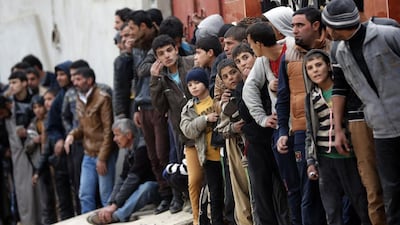BAGHDAD // Up to 500,000 civilians in Mosul are facing a “catastrophic” drinking water shortage as Iraqi forces advance on ISIL in the city, the United Nations warned on Wednesday.
“Nearly half a million civilians, already struggling to feed themselves day to day, are now without access to clean drinking water. The impact on children, women and families will be catastrophic,” said Lise Grande, UN humanitarian coordinator in Iraq.
On Tuesday, a local official said water supplies had been cut off for about 650,000 residents in 15 districts and suburbs after a pipeline was hit during fighting.
“The maintenance team cannot reach the pipeline because it lies in an area being fought over,” said Hussam Al Abar, a member of Mosul’s Nineveh provincial council.
Authorities were sending some 70 water trucks a day to areas controlled by the army but this would not be enough to supply residents, he said, adding that ISIL had attacked some of the trucks.
Some residents in east Mosul said they had resorted to pumping water from wells.
“We don’t have water or electricity. We are drinking well water but that’s not enough,” said Mohamed Khalil, 25.
Iraqi commanders said around 40 per cent of eastern Mosul had been retaken from the extremists since an offensive to recapture the city began on October 17.
The forces have told civilians to stay at home to prevent massive displacement from the city.
Mr Al Abar said some 1.5 million people were still inside Mosul.
“We need the help of international organisations for the hospitals. We have people wounded from suicide bombings and rocket attacks from Daesh who need treatment,” he said.
When Mr Al Abar arrived at a field hospital in an eastern suburb he tried to calm angry people, many of whom had been displaced from inside Mosul.
“We don’t have water, food, electricity,” said Nadim Shibab, one of the displaced. “Nothing, nothing, no life.”
With winter setting in, aid workers say a full siege is developing around the city and poor families are struggling to feed themselves after prices rose sharply in tandem with the offensive.
The longer the conflict drags on, the more civilians will suffer as they are also exposed to violence from the militants bent on crushing any opposition to their rule.
Deputy UN high commissioner for human rights Kate Gilmore said on Wednesday there were reports that ISIL shot dead 27 civilians in public in Mosul’s Muhandiseen Park last week. The group has previously killed residents it suspects of collaborating with the Iraqi army.
* Agence France-Presse, Reuters

